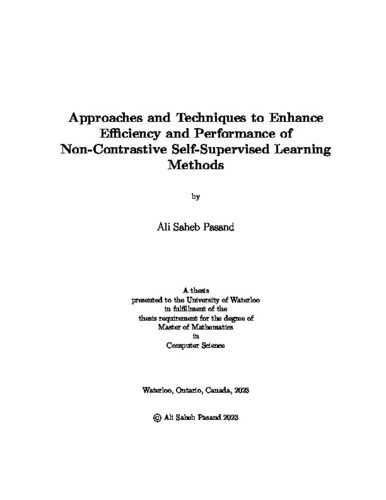| dc.description.abstract | Self-supervised learning (SSL) methods have gained considerable attention in recent years
due to their ability to learn useful representations of data without relying on labels during
training. These methods have revolutionized research across various domains, including
Natural Language Processing, Computer Vision, and Graph Deep Learning. SSL methods
can be classified into three categories: Generative, Predictive, and Dual-Encoder. Among
these, Dual-Encoder methods have gained significant popularity in many applications as, in
contrast with generative methods, they do not require training a powerful decoder. Also, in
contrast with predictive SSL methods, they do not need a careful design of the pre-training
task. However, Dual-Encoder techniques suffer from collapse in representation space, since
mapping all the samples into the same point in the embedding space is the trivial solution
to their optimization problem. Based on their mechanisms for preventing this issue, those
can be further divided into two classes: Contrastive and Non-Contrastive. Contrastive
techniques prevent representation collapse using negative sampling, while Non-Contrastive
techniques employ asymmetries such as stop-gradient or information maximization through
Covariance/Cross-Covariance matrices whitening.
This thesis aims to enhance two classes of Non-Contrastive Dual-Encoder SSL methods
- Asymmetry-Based and Covariance-Based. The proposed improvements are as follows:
• Covariance-Based methods: This thesis proposes techniques to enhance the effi-
ciency and performance of Covariance-Based methods. Specifically, the invariance
loss term’s efficiency is improved through various data sampling techniques, and
the covariance whitening term’s efficiency is enhanced through random dimension
selection, LSH bucketing, Nystrom approximation, and random projection. These
techniques are thoroughly tested and validated.
• Asymmetry-Based methods: This thesis enhances the performance of Asymmetry-
Based methods by preventing rank degradation and early termination of the update
procedure for the target network.
Overall, this thesis proposes novel techniques to enhance the efficiency and performance
of Non-Contrastive Dual-Encoder SSL methods. Proposed ideas tested and validated for
benchmark static graph datasets. However, those are applicable to other applications and
modalities as well. | en |

